Louisiana Alcohol Seller Server Permit Course
What is the Louisiana Alcohol Seller Server Permit Course?
The Louisiana Alcohol Seller Server Permit Course is a mandatory training program for a...

The Louisiana Alcohol Seller Server Permit Course is a mandatory training program for anyone who wishes to sell or serve alcohol in Louisiana. This course is designed to teach individuals how to properly serve alcohol in a responsible manner, including how to identify underage individuals and how to recognize signs of intoxication. By completing this course, individuals can obtain their Louisiana Alcohol Seller Server Permit, which is required by law to serve or sell alcohol in the state.
The Louisiana Alcohol Seller Server Permit Course is important because it helps ensure that alcohol is served and sold responsibly in the state. By completing this course, individuals are educated on the potential risks and consequences associated with serving alcohol to underage individuals or those who are already intoxicated. This helps prevent alcohol-related incidents, such as drunk driving and underage drinking.
The Louisiana Alcohol Seller Server Permit Course covers a wide range of topics related to alcohol service and sales. Some of the key topics covered in the course include:
The Louisiana Alcohol Seller Server Permit Course takes approximately 2-3 hours to complete. The course is available online and can be completed at the individual’s own pace. Once the course is completed, individuals must pass a final exam with a score of 70% or higher to obtain their Louisiana Alcohol Seller Server Permit.
The cost of the Louisiana Alcohol Seller Server Permit Course varies depending on the provider. However, the average cost of the course is around $25.
Anyone who works in the state of Louisiana and serves or sells alcohol is required to complete the Louisiana Alcohol Seller Server Permit Course. This includes bartenders, waiters and waitresses, and store clerks who sell alcohol. Even if an individual is only working a temporary or seasonal job, they must still complete the course and obtain their permit.
The Louisiana Alcohol Seller Server Permit Course is available online through several approved course providers. These providers offer the course in a user-friendly format that can be completed at the individual’s own pace. Some of the most popular course providers include ABSEC (https://absecllc.com).
When choosing a Louisiana Alcohol Seller Server Permit Course provider, it’s important to consider several factors, including:
Obtaining a Louisiana Alcohol Seller Server Permit not only ensures that individuals are serving alcohol responsibly, but it also offers several benefits, including:
While the Louisiana Alcohol Seller Server Permit Course is not overly difficult, it does require individuals to study and take the course seriously. Here are a few tips to help ensure you pass the course:
Obtaining a Louisiana Alcohol Seller Server Permit is an important step for anyone who wishes to work in the alcohol service or sales industry in Louisiana. By completing the course and obtaining their permit, individuals can ensure that they are serving alcohol responsibly and in compliance with Louisiana state laws and regulations. By choosing a reputable course provider and taking the course seriously, individuals can gain the knowledge and skills necessary to excel in their role as an alcohol server or seller.
Louisiana Responsible Vendor Training is a requirement for businesses that sell and serve alcohol in the state of Louisiana. This training ensures that business owners and their employees understand the laws, rules, and regulations related to the sale and service of alcohol. In this comprehensive guide, we will explore everything you need to know about Louisiana Responsible Vendor Training.
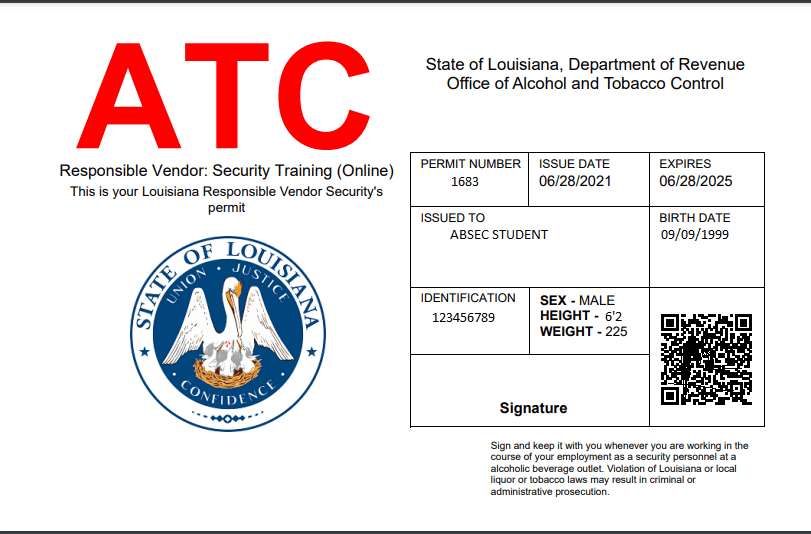
Louisiana Responsible Vendor Training is a state-mandated program designed to educate individuals who sell and serve alcohol on the responsible service and sale of alcohol. The program is aimed at reducing alcohol-related incidents and promoting public safety. The training covers topics such as identifying fake IDs, recognizing signs of intoxication, and preventing underage sales.
Any business that sells or serves alcohol in Louisiana is required to have at least one employee complete Louisiana Responsible Vendor Training. This includes bars, restaurants, grocery stores, and convenience stores.
The Louisiana Responsible Vendor Training program covers a wide range of topics related to responsible alcohol sales and service. Some of the key areas that employees will learn about include:
Louisiana Laws and Regulations – The training covers the laws and regulations related to the sale and service of alcohol in Louisiana.
Identification – The training covers the proper way to identify a customer’s age and how to identify a fake ID.
Signs of Intoxication – The training covers how to identify when a customer has had too much to drink and when to refuse service.
Preventing Underage Sales – The training covers the steps that employees can take to prevent underage sales.
Liability – The training covers the potential liabilities that businesses face if they sell alcohol to an intoxicated customer or to a minor.
In addition to these topics, the training also covers the importance of making informed decisions when it comes to alcohol sales and service. Employees will learn about the responsibilities that come with selling and serving alcohol and how to manage alcohol-related situations in a responsible and effective manner.
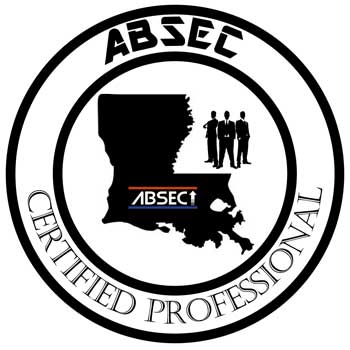
Completing Louisiana Responsible Vendor Training is quick and easy. There are several online courses available that provide the training required by the state. These courses are self-paced, allowing employees to complete the training at their own convenience. This means that employees can complete the course on their own time, making it easy to fit the training into their busy schedules.
Upon completion of the course, employees will receive a certificate of completion that can be used to show that they have met the state requirements for responsible vendor training. This certificate can also be used to demonstrate their commitment to responsible and safe alcohol sales and service practices, building trust and credibility with customers and the community.
Providing your employees with Louisiana Responsible Vendor Training comes with several important benefits, including:
Completing a Louisiana Responsible Vendor Training course has numerous benefits, both for individuals and for businesses. Here are a few key advantages of taking this course:
Legal Compliance: By completing a Louisiana Responsible Vendor Training course, individuals and businesses can ensure that they are in compliance with the state’s laws and regulations regarding alcohol sales. This can help avoid penalties, fines, and legal trouble.
Improved Customer Service: The training course teaches best practices for responsible alcohol sales and service. This can lead to better customer experiences and improved customer satisfaction, which can increase repeat business and help build a positive reputation.
Employee Safety: Responsible alcohol sales and service practices can help prevent accidents and injuries related to alcohol consumption. This can create a safer work environment and help reduce the risk of liability.
Increased Sales: By providing a responsible, safe, and enjoyable environment for customers, businesses can increase alcohol sales and profits.
Improved Employee Performance: By providing employees with comprehensive training, businesses can help improve their performance, leading to a more efficient and effective workplace.

The Louisiana Responsible Vendor Training course covers a wide range of topics, including the laws and regulations regarding alcohol sales and service in Louisiana, responsible alcohol sales and service practices, identifying and preventing underage drinking, preventing over-consumption, and managing intoxicated individuals. The course is designed to be easy to understand, engaging, and informative, making it accessible to individuals and businesses of all sizes and backgrounds.
Enrolling in Louisiana Responsible Vendor Training is simple and straightforward. The course can be taken online at your own pace, allowing you to complete it at a time that is convenient for you. To enroll, simply visit the website of an approved provider, such as absecllc.com, and follow the instructions for registering and paying for the course.
Once you have completed the Louisiana Responsible Vendor Training course, you will receive a certificate of completion that you can use to demonstrate your knowledge and commitment to responsible alcohol sales and service. This certificate can be a valuable asset for individuals and businesses, as it shows customers, employees, and regulators that you take your responsibilities seriously and are committed to providing a safe and responsible environment.
Completing a Louisiana Responsible Vendor Training course is an important step for individuals and businesses involved in alcohol sales and service in Louisiana. The training provides valuable knowledge and skills, and can help ensure legal compliance, improve customer service, enhance employee safety, increase sales, and improve employee performance. To enroll in the Louisiana Responsible Vendor Training course, simply visit an approved provider, such as absecllc.com and follow the instructions for registering and paying for the course.

Obtaining and renewing a bar card in Louisiana involves completing a responsible vendor training course, which is overseen by the state’s Alcohol and Tobacco Control (ATC). This program is designed to ensure that all alcohol servers are well-versed in liquor regulations and responsible alcohol service.
Louisiana’s Responsible Vendor Training program is essential for anyone seeking to obtain their bar card or renew their existing certification. The RV class provided on the ATC website aims to educate alcohol vendors on the proper laws and regulations surrounding the sale and service of alcoholic beverages or tobacco products.
Renewing your bar card is crucial for maintaining compliance with Louisiana law. It ensures that alcohol servers continue to be responsible vendors, equipped to oversee the sale and service of alcohol in a lawful and ethical manner.
The Louisiana ATC is responsible for enforcing liquor regulations in the state. The ATC’s oversight ensures that vendors who are authorized to sell alcoholic beverages adhere to the laws governing the sale and service, promoting a safe and responsible drinking environment and renew their licenses within 45 days.
The ATC website lists various online training options available for completing the Responsible Vendor Training course. These courses provide flexibility for alcohol servers to obtain or renew their bar cards while ensuring they acquire the necessary knowledge and skills to responsibly serve alcohol.

Louisiana’s Responsible Vendor Training program is essential for anyone seeking to obtain their bar card or renew their existing certification. The program aims to educate alcohol servers on the proper laws and regulations surrounding the sale and service of alcoholic beverages.
Renewing your bar card is crucial for maintaining compliance with Louisiana law. It ensures that alcohol servers continue to be responsible vendors, equipped to oversee the sale and service of alcohol in a lawful and ethical manner.
The Louisiana ATC is responsible for enforcing liquor regulations in the state. Their oversight ensures that alcohol servers adhere to the laws governing the sale and service of alcoholic beverages, promoting a safe and responsible drinking environment.
There are various online training options available for completing the Responsible Vendor Training course. These courses provide flexibility for alcohol servers to obtain or renew their bar cards while ensuring they acquire the necessary knowledge and skills to responsibly serve alcohol.

Obtaining a Louisiana bar card requires compliance with the state’s regulations and completing the responsible vendor training course overseen by the Louisiana Alcohol and Tobacco Control (ATC). This process ensures that servers are knowledgeable about how to sell alcohol as per Louisiana law and equipped to responsibly sell or serve alcoholic beverages.
To obtain a Louisiana bar card, individuals must complete the responsible vendor training course approved by the ATC. This involves gaining a comprehensive understanding of the state of Louisiana’s liquor laws, server training, and the legal responsibilities of alcohol servers. After completing the course, applicants can apply for their bar card and become authorized to sell or serve alcohol in Louisiana.
The Louisiana Alcohol and Tobacco Control sets licensing requirements for individuals seeking to obtain a bar card. These requirements may include completing the RV class, passing a final exam, and meeting any other criteria specified by the ATC, and all within 45 days. Adhering to these licensing requirements is essential for obtaining and maintaining a Louisiana bar card as stated on the ATC website.
As a vendor who is authorized to sell alcohol in Louisiana, individuals have the responsibility to adhere to state liquor regulations, promote responsible alcohol service, and ensure the safety of patrons. Understanding and fulfilling these responsibilities is integral to maintaining compliance with Louisiana law and upholding ethical alcohol service standards as a licensed bar card holder.

Renewing ATC certification and the responsible vendor server permit is crucial for alcohol servers in Louisiana to continue serving alcohol legally and responsibly. The renewal process, as per the ATC website, ensures that individuals remain up to date with liquor regulations, uphold the standards of selling alcohol responsibly, and renew their license within 45 days.
Renewing the responsible vendor server permit involves completing the required renewal course or a final exam, within 45 days, specified by the ATC. This process aims to update alcohol servers on any regulatory changes, reinforce responsible alcohol service practices, and ensure continued compliance with Louisiana’s liquor laws.
ATC certification offers various benefits for alcohol servers, including legal authorization to sell or serve alcohol, enhanced knowledge of liquor regulations, and the ability to contribute to a safe and responsible drinking environment. Maintaining ATC certification demonstrates a commitment to responsible alcohol service and compliance with Louisiana’s alcohol laws.
The responsible vendor course plays a vital role in educating alcohol servers on the legal and ethical requirements of alcohol service, promoting responsible drinking practices, and maintaining a safe environment for patrons. Completing this course is essential for obtaining and renewing ATC certification, emphasizing the significance of responsible alcohol service in Louisiana.

When choosing an online course for server training or RV Class, it’s important to consider the content, accreditation, and accessibility. Look for courses that cover Louisiana liquor laws and are approved by the state‘s Alcohol and Tobacco Control (ATC). Ensure that the course provides a comprehensive understanding of alcohol regulations and responsible service practices.
Completing responsible vendor training online offers several advantages. It provides flexibility for alcohol servers to study at their own pace and convenience. Online courses also often include interactive elements, quizzes, and resources to enhance learning. Additionally, online courses eliminate the need for physical attendance, making it convenient for vendors who are authorized to obtain or renew their bar cards.
To obtain a Louisiana Responsible Vendor Card, individuals must complete the state-approved responsible vendor training course. This certification demonstrates that alcohol servers are knowledgeable about Louisiana liquor laws and are committed to responsibly serving alcohol. It is an essential requirement, stated by the state of Louisiana, for anyone involved in the sale or service of alcoholic beverages or tobacco products.
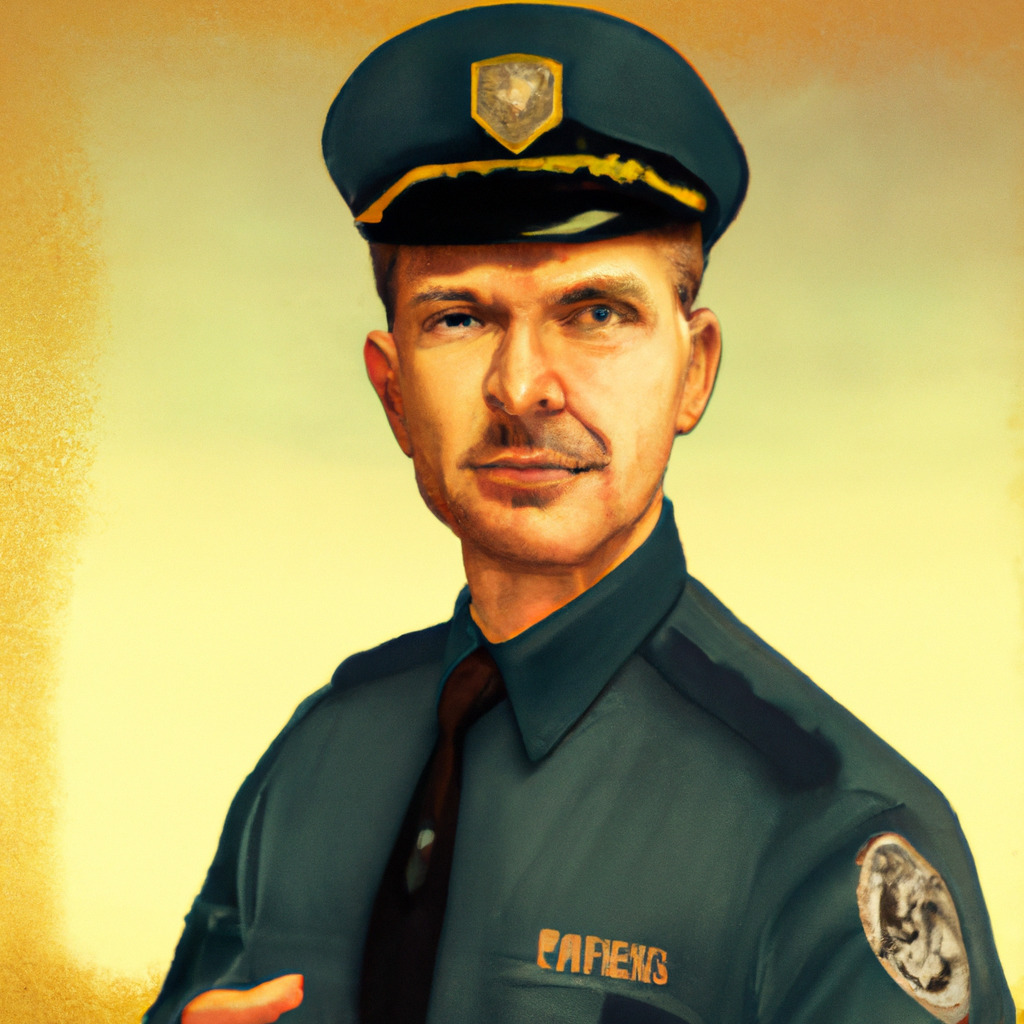
Understanding Louisiana alcohol laws is crucial for alcohol servers to ensure compliance with state regulations. This includes knowledge of legal drinking age, sale hours, prohibited practices, and other relevant provisions outlined by the Louisiana Office of Alcohol and Tobacco Control.
As a vendor who is authorized to sell alcohol, sellers in Louisiana have legal obligations towards responsible service of alcoholic beverages and tobacco products. They must adhere to strict regulations governing the sale and service of alcoholic beverages to promote safe and ethical practices. It’s crucial for sellers to be well-informed about the legal responsibilities and obligations associated with their role.
The ATC has specific regulations for responsible vendors in Louisiana. These regulations outline the standards and requirements for alcohol servers to obtain or renew their responsible vendor certification. It’s important for alcohol servers to familiarize themselves with ATC’s regulations to ensure compliance with state laws and maintain their certification.
What is the Louisiana Alcohol Seller Server Permit Course?
The Louisiana Alcohol Seller Server Permit Course is a mandatory training program for a...
[et_pb_row _builder_version="4.16" background_size="initial" background...
[et_pb_row _builder_version="4.16" _module_pre...
The Responsible Vendor program in Louisiana was started in 1997 and has been a very successful effort in terms of increasing the safety of serving alcohol and tobacco products in Louisiana.
The program requires that any person serving alcohol or tobacco products in Louisiana receive and complete a training course to obtain an RV Server Permit within 45 days of their hire. This rule covers anyone who deals with customers who are purchasing alcohol or tobacco products in Louisiana. The Louisiana Office of Alcohol and Tobacco Control (ATC) allows alcohol training through the use of online courses as well as in person training. Alcohol server training is required in the State of Louisiana for any employee of a vendor who is authorized to sell alcohol and tobacco products in the normal course of their business. The alcohol sales training program must be completed within 45 days of their hire date. The RV Class will include a final exam for the alcohol seller and, according to Louisiana law, this ATC training must be approved by the Louisiana ATC and provided by an authorized vendor. The certification is valid for four years and must be renewed to maintain compliance.
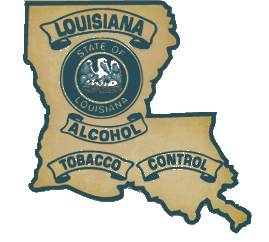
The program is governed and monitored by the Louisiana Alcohol and Tobacco Control (ATC). The retail locations at which licensed servers are employed are required to keep employment records on site for inspection by ATC Enforcement Agents. ATC Enforcement Agents also routinely check the compliance of licensed vendors and their servers. Servers found to sell or serve alcohol/tobacco products in violation of Louisiana can be held liable in criminal or civil court depending on the violation. ATC Agents have begun issuing administrative citations directly to RV Servers for violations of Louisiana Title 26 violations.

The ATC also governs the providers who are authorized to provide training and certification in this program. A valid certificate can only be issued by a Louisiana ATC Authorized Vendor. The ATC publishes a list of authorized providers, which can be found here.
There are several companies advertising online that offer deeply discounted certification courses for the Louisiana ATC but are not authorized. It is your responsibility to make sure that the course you are taking is valid and accepted by the ATC.
Additionally, local town, city and parish ordinances may also govern the issuance and management of permits to serve alcohol and tobacco products.
The content of the Louisiana responsible vendor training course is similar for all providers and a listing of the topics required to be taught is provided by the Louisiana ATC. The topics that will be covered are:

You will also learn:
The server training courses shall include but not be limited to the following subject areas:
A server or security personnel who violates alcohol or tobacco server law is subject to all of the following penalties:
A vendor who sells or serves to minors will not have its alcohol or tobacco permit revoked in the following instances:
A vendor may not use as a defense the fact that he was absent from the licensed premises at the time a violation occurred if the violations are flagrant, persistent, repeated, or recurring.
ATC takes into consideration compliance with the responsible vendor program and other methods taken by the business owners to prevent the sale of alcoholic beverages and tobacco products to persons under their respective legal ages.

Q: I am one of the vendors defined in the program. What are my responsibilities?
A: As a Responsible Vendor, you must do all of the following to maintain your Responsible Vendor certification:
Q: I am employed as a server or as security for a vendor. What are my responsibilities under this program?
A: Servers and security personnel have the following responsibilities under the Louisiana Responsible Vendor program:
Forms of acceptable identification in Louisiana
Customers must show one of the following when asked to present identification for service:
State issued driver’s license from Louisiana or another state (including duplicates)
Special identification card from Louisiana or another state
Passport or visa issued by the federal government or another country or nation
Military or federal ID issued by the federal government
Identification policies should be established to decrease the chances that a minor will be served alcohol or tobacco. These policies should include:
Studies have shown that younger servers are less inclined to check identification and more likely to serve underage persons. Minimum age of seller policies will help reduce the likelihood that underage persons will obtain alcohol or tobacco. Louisiana liquor laws ensure responsible alcohol service through the Louisiana RV program.
The Office of Alcohol and Tobacco Control (ATC) offers the following guidelines when accepting electronic identification for the purchase of alcohol and/or tobacco products:
1.LA Wallet is the ONLY ACCEPTABLE form of electronic identification.
2.It is at the discretion of each business whether they will accept the digital ID.
3.Businesses required by ATC to utilize ID scanners must still request a physical ID if scanners are unable to read the digital ID.
4. If the person accepting the digital ID is unable to read it, it will be as if the licensee did not present a driver’s license or ID at all.
5.All other rules and guidelines still apply when ensuring an individual is of legal age to purchase and/or consume alcohol and tobacco products.
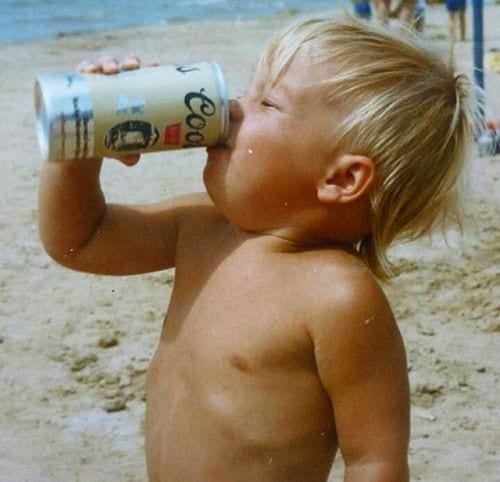
Alcohol use by young people is the most serious drug problem facing our nation and our state. Alcohol kills more young people than all illicit drugs combined, is a factor in the three leading causes of death among 15-24 year olds and is a gateway drug to other drugs.3
ATC is committed to preventing underage access to alcohol and tobacco products. ATC enforces the prohibition against selling alcohol to minors by frequently conducting compliance checks. A compliance check is an unannounced inspection by ATC agents to determine if an establishment, employees, and customers are complying with alcohol and tobacco laws.
There are many mechanisms by which an establishment can be selected for a compliance check. The most common method is being selected in a random sample of all permit holders. Another way establishments are selected is in response to complaints received by ATC concerning alleged illegal activity.
If a business or its employee fails a compliance check, the business or employee will be issued a citation
by an agent. The citation indicates the date and time of the offense, who committed the violation, and the date on which a hearing will be set.
At least 10 days prior to the hearing, you will receive a notice of fine or summons. The notice will direct you to either pay a fine prior to the hearing or appear and contest the fine. When you “contest” a fine, it means you disagree with the issuance of the citation and want to challenge the penalty. When you pay the fine prior to the hearing, you are admitting guilt and agreeing to the penalty.
It is not a defense to a citation that a vendor was absent from the licensed premises at the time that a violation occurred, if the violation was flagrant, persistent, repeated, or recurring.
For detailed Louisiana alcohol-related accidents and injury statistics, please visit http://datareports.lsu.edu/.

Remember: Alcohol seller-servers cannot sell or serve alcohol to an intoxicated person. As a server, you should always assess the nature and magnitude of a person’s condition prior to selling to or serving that person. Consequently, server intervention could play a very important role in reducing drunk-driving accidents. While the liability for injuries caused by driving under the influence of alcohol lies primarily with intoxicated drivers themselves, that is not the case for serving alcohol to minors. You may be responsible for injuries caused by a minor to whom you serve alcohol illegally.
The following are behavioral signs of intoxication that servers should observe when determining whether to continue to serve an individual:
1. Lessened inhibitions (increased lack of restraint in social settings)
2. Impaired judgment
3. Slow reactions
4. Decreased coordination
5. You may also notice slurred speech, glassy eyes, strong smell of alcohol, and exaggerated emotional outbursts. They may also have trouble walking or making decisions, and may annoy other customers.
If you have any doubts about whether a person is intoxicated you must refuse to sell alcohol to them.
Refusing Entry
Intoxicated persons should not be allowed to enter your establishment under any circumstances, short of physical confrontation. If a customer insists on re-entry and the door person feels a physical confrontation will ensue, admit the party and either call the police or security, whichever is applicable.
Terminating Service
An employee who thinks a customer is intoxicated should cease serving the customer immediately and inform the manager. Company policy should dictate whether an employee is permitted to terminate service or if this decision is a management function.
If the decision to cease service to a customer is an employee function and the customer in question attempts to order more drinks, the employee should acknowledge the order, but immediately get the manager to visit the table. The manager should introduce himself, with title, and be friendly, yet firm. When the decision is made to cease serving the customer, managers should back up the decision of their staff members, regardless of who the customer might be.
When terminating service, staff or management should always remain calm. Avoid antagonizing the customer with statements like, “You’ve had way too much to drink,” or, worse, “I can’t serve you – you’re drunk.” Instead, let the customer know that your job and license would be at risk if you served another drink and that you are doing this for his own safety.
When dealing with a person who is “out of control,” the psychological message to give the customer is one of control. If the customer becomes offended or argumentative, don’t attempt to reason with him. If the customer becomes belligerent or physically threatening, get assistance from other staff or security personnel.
Q: Who is required to have a responsible vendor permit?
Any employee of an alcoholic beverage or tobacco dealer who is authorized to sell or serve alcoholic beverages or tobacco products, alternative nicotine products, or vapor products or who deals with customers who purchase or consume alcoholic beverages or tobacco products must obtain a responsible vendor permit within 45 days of employment.
Q: Is the owner of an alcoholic beverage or tobacco outlet required to have a responsible vendor permit?
No, owners are not required to obtain a responsible vendor permit. However, owners who sell or serve alcoholic beverages or tobacco products to persons under the legal age face maximum penalties.
Q: Where can I take a responsible vendor course?
A: Responsible vendor courses are provided across the state at class room locations and are also available online. Upon completion of an online course, you should be able to print your temporary certificate.
Q: How/where do I obtain my responsible vendor permit?
A: Responsible vendor permits are available on the ATC website under “permits” then “responsible vendor” then “print/download your RV permit”
Q: How long is my responsible vendor permit good for?
A: Responsible vendor permits expire every four years on the last day of the month in which you took the responsible vendor course.
Q: I have a Louisiana responsible vendor card. Do I need a Parish card?
A: Any vendor or server subject to a local ordinance requiring participation by the vendor or its employees in a server or security personnel training or licensing program shall be exempt from the local server training and licensing regulation if the vendor is certified as a responsible vendor under the provisions of the State law. However, this does not apply to any local seller or server licensing regulations or ordinances that were in effect on June 1, 1997. Please check with your local licensing authority for additional information.
Q: If I send my employees to a responsible vendor class and they still sell to minors, am I responsible?
A: In this scenario, the business would receive a warning for the first violation. The business would receive a citation for any additional violations within a three year period. However, when assessing penalties to permit holders, ATC takes into consideration compliance with the responsible vendor program and other methods taken by business owners to prevent the sale of alcoholic beverages and tobacco products to person under the legal drinking age.
Q: If I pay for my employees to attend a responsible vendor class, do their permits belong to me?
A: No, responsible vendor permits belong to the servers who took the class.
Q: How long do my employees have to obtain a responsible vendor server or security personnel permit?
A: Within 45 days of commencement of employment.